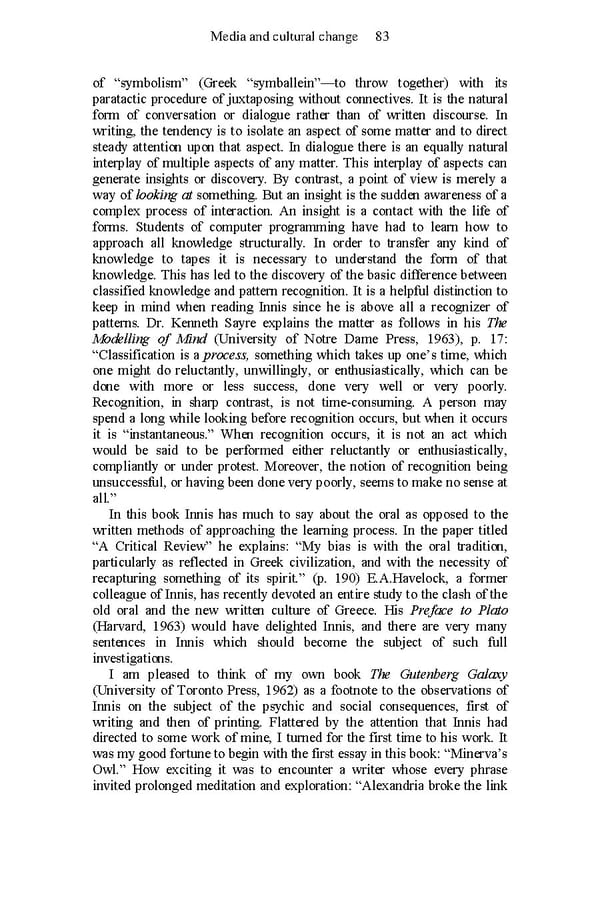Media and cultural change 83 of “symbolism” (Greek “symballein”—to throw together) with its paratactic procedure of juxtaposing without connectives. It is the natural form of conversation or dialogue rather than of written discourse. In writing, the tendency is to isolate an aspect of some matter and to direct steady attention upon that aspect. In dialogue there is an equally natural interplay of multiple aspects of any matter. This interplay of aspects can generate insights or discovery. By contrast, a point of view is merely a way of looking at something. But an insight is the sudden awareness of a complex process of interaction. An insight is a contact with the life of forms. Students of computer programming have had to learn how to approach all knowledge structurally. In order to transfer any kind of knowledge to tapes it is necessary to understand the form of that knowledge. This has led to the discovery of the basic difference between classified knowledge and pattern recognition. It is a helpful distinction to keep in mind when reading Innis since he is above all a recognizer of patterns. Dr. Kenneth Sayre explains the matter as follows in his The Modelling of Mind (University of Notre Dame Press, 1963), p. 17: “Classification is a process, something which takes up one’s time, which one might do reluctantly, unwillingly, or enthusiastically, which can be done with more or less success, done very well or very poorly. Recognition, in sharp contrast, is not time-consuming. A person may spend a long while looking before recognition occurs, but when it occurs it is “instantaneous.” When recognition occurs, it is not an act which would be said to be performed either reluctantly or enthusiastically, compliantly or under protest. Moreover, the notion of recognition being unsuccessful, or having been done very poorly, seems to make no sense at all.” In this book Innis has much to say about the oral as opposed to the written methods of approaching the learning process. In the paper titled “A Critical Review” he explains: “My bias is with the oral tradition, particularly as reflected in Greek civilization, and with the necessity of recapturing something of its spirit.” (p. 190) E.A.Havelock, a former colleague of Innis, has recently devoted an entire study to the clash of the old oral and the new written culture of Greece. His Preface to Plato (Harvard, 1963) would have delighted Innis, and there are very many sentences in Innis which should become the subject of such full investigations. I am pleased to think of my own book The Gutenberg Galaxy (University of Toronto Press, 1962) as a footnote to the observations of Innis on the subject of the psychic and social consequences, first of writing and then of printing. Flattered by the attention that Innis had directed to some work of mine, I turned for the first time to his work. It was my good fortune to begin with the first essay in this book: “Minerva’s Owl.” How exciting it was to encounter a writer whose every phrase invited prolonged meditation and exploration: “Alexandria broke the link
 Essential McLuhan Page 89 Page 91
Essential McLuhan Page 89 Page 91